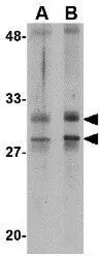METTL7A antibody
Cat. No. GTX85369
Cat. No. GTX85369
-
HostRabbit
-
ClonalityPolyclonal
-
IsotypeIgG
-
ApplicationsWB ICC/IF ELISA
-
ReactivityHuman, Mouse

